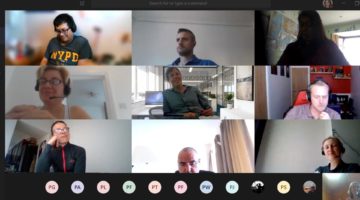Over the spring and summer months, Progressive TSL had planned to attend conferences and events in London, Aberdeen, Brighton and Paris. It would be our chance to catch up with our network – understand the key challenges, opportunities and drivers for the asset-intensive industries in which we work, and share experiences and insight into the latest digital and technological advancements.
Sadly, lockdown prevented these physical events from happening, but the organisers have responded fast, transforming physical opportunities into virtual ones. These virtual events have done really well to keep conservations going and given us plenty to think about for the future.
As expected, there’s a lot of focus on the impact of COVID 19 on our industries and, in particular, the energy industry, but we have also been educated in some of the latest innovations we can expect to emerge over the coming years.
Here are some key takeaways from Progressive TSL’s 2020 spring-summer virtual conference season so far.
This Conference, based usually in Aberdeen, is attended by the Oil & Gas IT community. We dipped in and out during the day; these talks stood out.
Survive and Thrive: How data and analytics can help carry your business out of the current climate
The day opened with a breakfast briefing by Sean Robertson, Client Director & IoT Lead, Merkle who was then joined by Angus Murray from TAQA, Gillian Docherty from The Data Lab and Rina Ladva from Microsoft. This introduced us to some of the key themes that underpinned many of the later presentations.
Following the oil price crash and COVID 19, the current focus of the energy industry is on minimising further losses. However, this has to be balanced against the value of digital transformation. The panel recognised the importance of centralised reporting and connectivity of systems during this enforced period of remote working. Where possible, innovative technologies such as IoT, AI, robotics and digital twinning can address some of the challenges of managing offshore platforms with limited staff.
Peter Drucker’s quote ‘culture eats strategy for breakfast’ really resonated – the current crises has demonstrated new technology can be adopted apace.
Some of the themes raised in this session about the key role digitalisation takes in keeping remote operatives safe during these challenging times are addressed in our recent blog.
Driving Drilling and Rig Site Crew Efficiency through Technology
During the current crises, we have read much about North Sea operators cutting CAPEX and OPEX with offshore staffing being reduced to the bare minimum necessary to meet HSE and maintenance constraints. Adebayo Aremu, Drilling Operations Superintendent from KCA Deutag, gave us a glimpse into the future. These leading engineering contractors are already running remote drilling untouched by operatives. Adebayo believes robotics on rigs is already becoming a reality. For more information on this see www.wellofinnovation.com.
The Current Landscape & Future Trends
The Closing Panel discussion provided perspectives both from within the energy sector from James McLean of CNOOC and leaders from the wider business community -Jude McCorry of SBRC and Louise Smith from Lloyds. There were many positives to take away from this final session; COVID-19 has proved home working can work really well, but managers need to be mindful of their staff’s wellbeing – working hours creep and the merging of day and night. The panel has already seen a shift in culture over the last few weeks with companies and individuals being more open to collaboration citing examples ranging from global innovations such as the Google and Apple joint COVID-19 Alert App to the Scottish Tech Army addressing COVID-19 challenges and post-pandemic economic recovery in Scotland.
Digital transformation and business continuity themes were explored in our recent blog
Throughout the day, we enjoyed watching BBC Scotland’s Mark Stephen expertly steering us through the wide variety of themes and insight shared over the day.
Oil Market Uncertainty in the age of COVID 19
As Sponsorship Partners, Progressive TSL had been looking forward to joining Frontier at their summer events. However, as an alternative, Frontier has introduced Frontier Live a series of webinars to discuss issues critical to the oil and gas industry. Simon Sjøthun, Partner and Head of London Office for Rystad Energy, presented for their second webinar.
The key takeaways from this talk were:
Transport reduction
We have seen COVID-19 severely attacking oil demand with Rystad showing that worldwide travel has decreased, over 93% of UK flights were cancelled in April 2020. Rystad has predicted this and other events will lead to a decrease in demand of over 4 billion barrels of oil worldwide in 2020.
Will the industry bounce back once COVID restrictions are lifted? It may be that this crisis changes our working behaviour with less business travel and more virtual communications on the horizon. Transport levels might remain low into the longer term.
Storage, Shut-ins and CAPEX reduction
Rystad recognised that across the world, we are reaching the limits of our storage capacity. Once the market starts up again, this could ultimately result in an oil shortage.
Many oil companies are considering shut-ins and some lower priority maintenance is being cancelled. E&P’s are also slashing their CAPEX with new exploration activity deferred or stopped entirely.
Share price fall
With all of these major touchpoints, we are headed to a steep production decline and low oil prices for the foreseeable. Behaviour in oil shares has shown that confidence is very low with shares in North Sea toppling.
It’s clear that the short-term view for oil isn’t good. In the long term, we hope circumstances start to normalise, but businesses should expect a tough time for sustainable oil pricing and production over the next few years.
Infor Inspire
Infor Inspire Online, offers a host of talks and breakout sessions discussing all aspects of Infor’s solutions. Progressive TSL are Infor Gold Channel Partners for Infor EAM, Infor OS and Infor SunSystems. We will enjoy getting an update from our colleagues at Infor on the latest developments in these solutions. As a flavour of the practical advice available we provide below some notes on one of the EAM presentations.
Predictive Analytics and Maintenance Management
Infor Asset Management System (Infor EAM) can store and act on data from IoT and PLC sensors (as well as spreadsheets and other resources) to send maintenance alerts (via Mobile through Infor OS) to supervisors who can then forward and assign work orders to technicians.
Real-time and historical data stored in Infor’s Data Lake can also be used in combination with analytics from Infor’s Birst Business Intelligence tool to support predictive and prescriptive maintenance.
Birst offers a networked approach so that finance, asset managers and IT staff can retain their control over data, leaving data scientists free to experiment and make predictions. These insights can then be shared across all departments.
Edgar De Groot, Director in Solution Consulting from Infor Birst, demonstrated how they used analytics to predict pump health for an oil and gas production company. Through the use of sensors, they gathered multiple points of data to determine an overall health score. They were then able to plot – using historical data, when specific pumps might breakdown. Predicting health means that supervisors can be warned and technicians can be assigned to maintain the pumps based on prediction patterns provided by Coleman, the AI component of Infor’s toolbox.
A very interesting talk that demonstrated how historical data can reveal patterns and then how Infor EAM can utilise these patterns and trends to develop maintenance plans based on data predictions.
Progressive TSL discussed how new technologies can be used to facilitate predictive maintenance strategies in our recent blog.
Oil Council Webinars
To replace their summer conference, over the coming months, the Oil Council will be hosting a series of Webinars where industry leaders will debate today’s key issues during a 60-minute interactive session.
The first of the series was on the thorny issue of “The Low Oil Price Will Derail The Re-Imagining of Energy”. This sparked some lively debate between the panel of experts – BP’s Jasper Peijs, BNP Paribas’ Mark Lewis, The Canadian Global Affair Institute’s Dr Richard Norris and Independent Oil & Gas’ Fiona MacAulay, overseen by Lundin’s Nick Walker. As the debate followed Chatham House Rules, we cannot share with you the details, but would encourage you to watch On-Demand – there really were some excellent cases made from both sides of the table.
There may not be a clear cut answer as to whether the current market conditions will lead to an acceleration of the energy transition. Still, some very persuasive arguments were made with a significant change in views from the live audience of 390, who were asked to cast their vote for or against the motion at the beginning and again at the end of the debate. We’ll not provide any spoilers – you’ll have to watch yourself to see which way the audience turned.
Our working life has been completely transformed by home working with regular interactions between colleagues replaced with Zoom calls, Microsoft Team meetings and Google Hangouts – these can take up a good chunk of a day. But that doesn’t mean that we have to miss out –all of this great content is available on-demand from the links provided. We look forward to continuing to attend virtual conferences in the next few months – check our events planner for those still to come.




